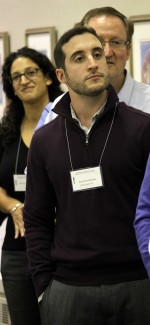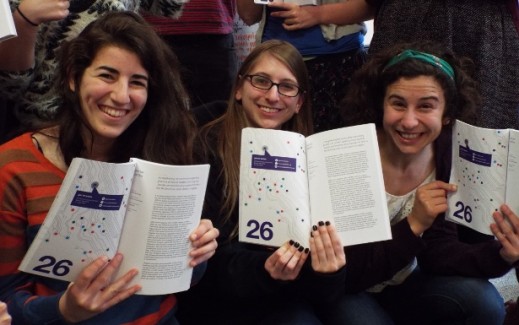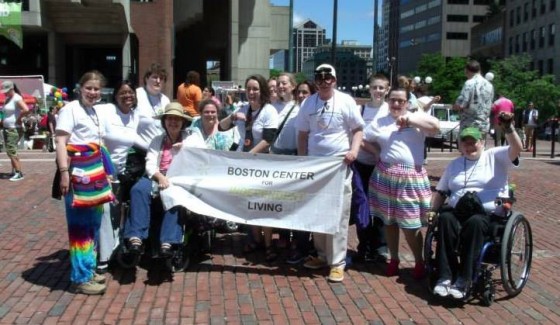By Rabbi Elan Babchuck, alum of the Seminary Leadership Project, rabbi at Temple Emanu-El in Providence, Rhode Island, and former community organizer in LA. Rabbi Babchuck reflects on the profound potential of the community organizing training JOIN for Justice led for 43 Conservative rabbis on October 28-29 2013 in NYC.
 Five years ago, I sat in a cavernous room around a couple dozen mismatched folding tables set up to accommodate 50+ people in Marin County, California. It was part of my “tryout” to become a community organizer with OneLA, the Industrial Areas Foundation network in Los Angeles. The truth is that it wasn’t just a tryout for me, but it was part of the continued experiment to test whether or not rabbinical students and rabbis – educated primarily as pastors, preachers, and programmers – could fit into the shoes of tough organizers trained to carefully push, agitate, and engender discomfort in the name of leadership development and the pursuit of power and justice.
Five years ago, I sat in a cavernous room around a couple dozen mismatched folding tables set up to accommodate 50+ people in Marin County, California. It was part of my “tryout” to become a community organizer with OneLA, the Industrial Areas Foundation network in Los Angeles. The truth is that it wasn’t just a tryout for me, but it was part of the continued experiment to test whether or not rabbinical students and rabbis – educated primarily as pastors, preachers, and programmers – could fit into the shoes of tough organizers trained to carefully push, agitate, and engender discomfort in the name of leadership development and the pursuit of power and justice.
I ended up getting the job, finding ways for the next couple of years to balance my life as a rabbinical student with my work as an organizer. Most days, I would drive north to Bel Air and study talmud, alternating between English, Hebrew, and broken Aramaic. I took in the stories of my rabbinic predecessors and made them my own, all while basking in the warm, California sun on American Jewish University’s idyllic campus. By mid-day, I would drive back down to Mid-City LA for afternoon meetings in dingy, poorly-lit church basements, alternating between English and broken Spanish. There, I internalized the profound struggles of my neighbors while we stood together, shoulder-to-shoulder, and committed to support one another from here on out.
I look back on those years with great fondness and a deep sense of nostalgia for the two lives I led. Much as I tried to bridge the gap between Mid-City and Bel Air, between one form of education and another, I never did. Later, when I was presented with an opportunity to continue organizing upon returning from a year of study in Israel, I couldn’t quite see how the two worlds could live in harmony. I was – and continue to be – greatly humbled by the vast resources invested in me by the Ziegler School and by OneLA, but I felt that I had to choose, and I chose the life of a rabbi.
At the end of October, I experienced a deeply powerful combination of deja vu and a vision of the world to come, once again in a poorly-lit room, and once again shoulder to shoulder with my peers as we made a covenant to continue supporting one another from here on out. After years of conversation and relationship building, JOIN for Justice partnered with the Rabbinical Assembly to train 43 rabbis in the field on the principles of community organizing. As Ron Wolfson has so beautifully narrated in his book Relational Judaism, organizing isn’t only a means to the end for social justice; it’s about building communities, deepening relationships, developing leaders, and putting people before programs.
For one and a half precious days, 43 of us shared our stories, sharpened our tools, and developed a collective vision for a rabbinate replete with one-to-ones, house meetings, and thick networks of real relationships within – and across – our respective communities. The work is by no means done (we just barely scratched the surface of our immense potential), but it has begun. 10 years after rabbinical students before me started pushing for this training and later shared the torch with me and my colleagues, we have arrived.
In organizing lingo, we often talk about the World As It Is and the World As It Should Be. Much like the biblical prophets before us preached from the mountaintops about their visions of an idyllic world, 43 of us came together to paint our own version of that picture. The work of organizing is about bridging the gap between the World As It Is and the World As It Should Be, about bringing our world one step closer to what it could be, what it Should Be.
For me, after years of struggling to bridge the gap between the world of organizing and the world of the rabbinate, between My World As It Is and My World As It Should Be, last week’s training brought them one step closer, and I look forward to continuing to build that bridge in partnership with the RA, JOIN for Justice, and the many dedicated colleagues who have invested their time, talent, and treasure into bringing this prophetic vision to fruition.





 Combined Jewish Philanthropies Young Leadership Division named JOIN for Justice Executive Director, Karla Van Praag, one of the 18 Most Influential Young Jewish Leaders in Greater Boston as part of the first annual
Combined Jewish Philanthropies Young Leadership Division named JOIN for Justice Executive Director, Karla Van Praag, one of the 18 Most Influential Young Jewish Leaders in Greater Boston as part of the first annual  Five years ago, I sat in a cavernous room around a couple dozen mismatched folding tables set up to accommodate 50+ people in Marin County, California. It was part of my “tryout” to become a community organizer with
Five years ago, I sat in a cavernous room around a couple dozen mismatched folding tables set up to accommodate 50+ people in Marin County, California. It was part of my “tryout” to become a community organizer with 




